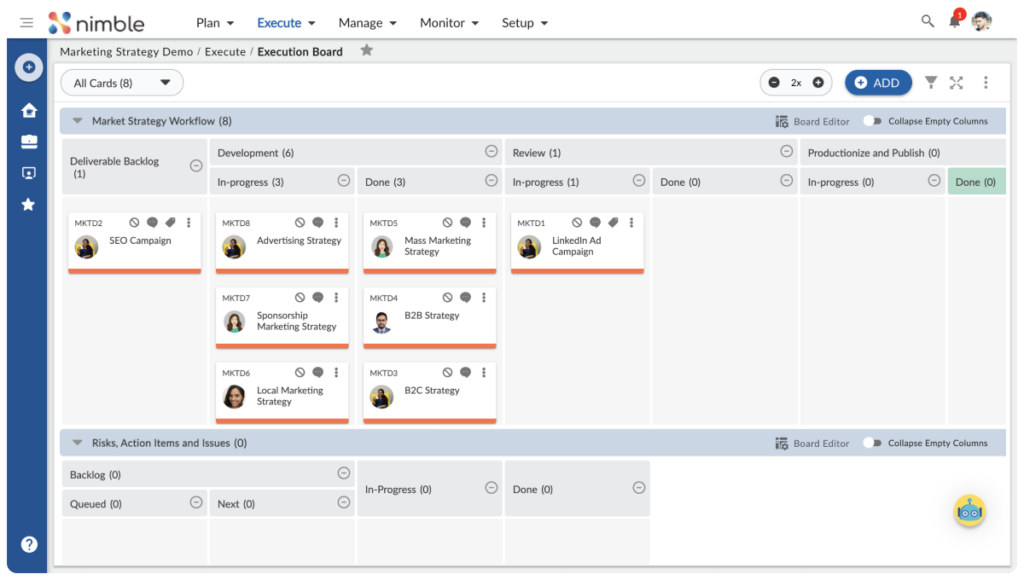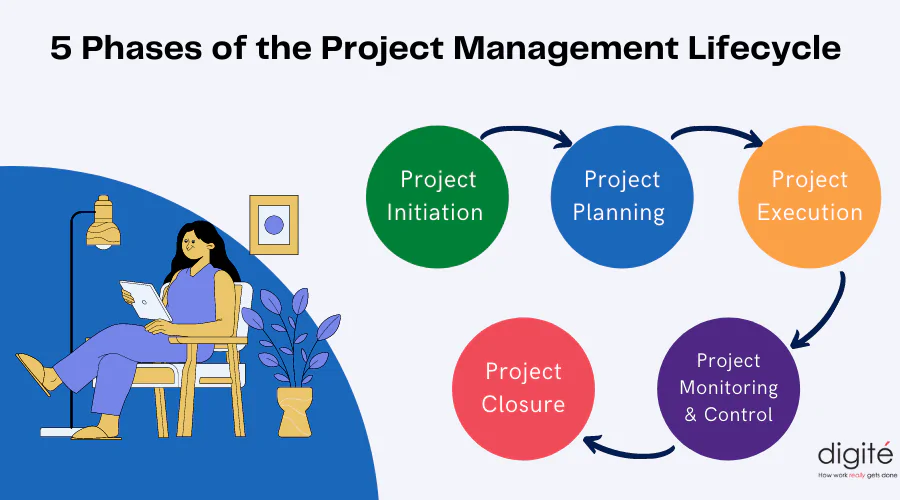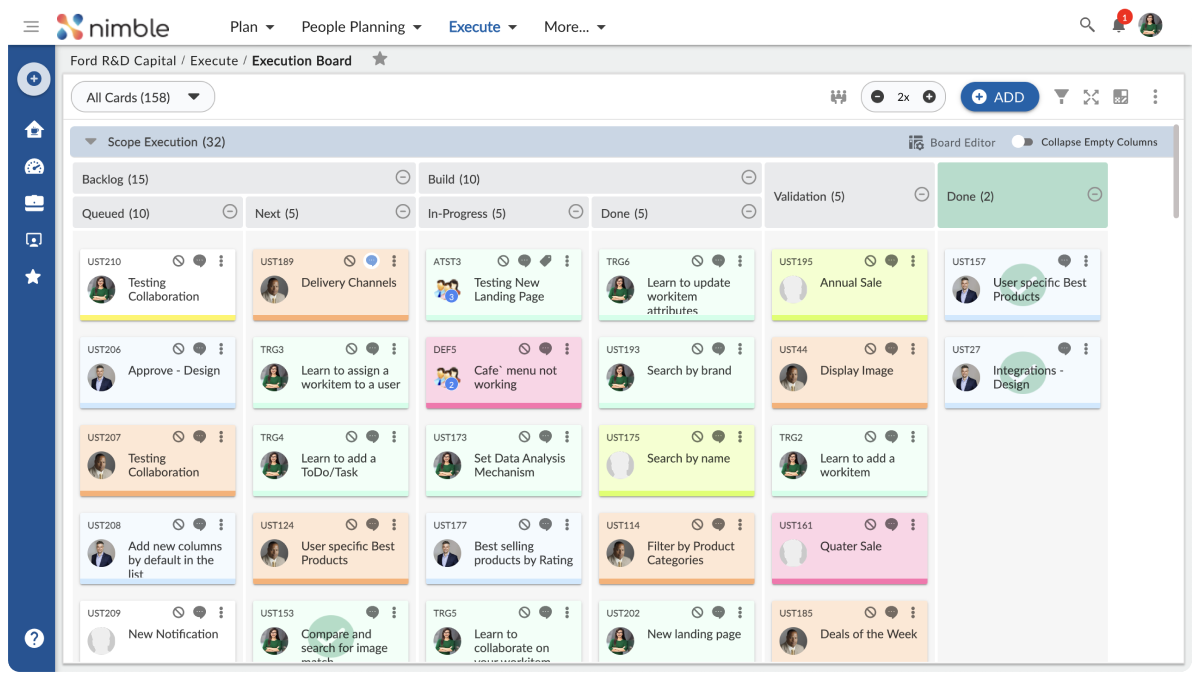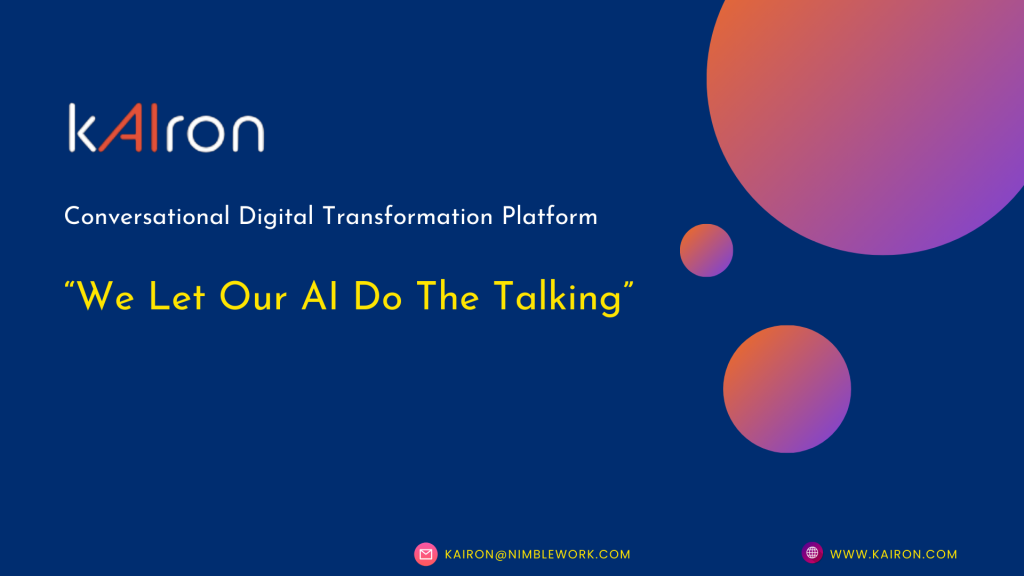Marketing Project Management 101: Tips, Tools, and Best Practices
- 18 mins read
-
 By
Bravin Wasike
By
Bravin Wasike
- Updated on May 15, 2024
Navigate to
In marketing, successful campaign execution hinges on meticulous planning and organized execution. This is where marketing project management (MPM) comes into play. MPM is the application of project management principles specifically tailored to the unique needs of marketing initiatives. It encompasses the entire lifecycle of a marketing project, from conceptualization and planning to execution, monitoring, and evaluation.
This comprehensive guide equips marketing professionals and stakeholders with the foundational knowledge and practical steps to navigate MPM effectively.
What is Marketing Project Management?
Marketing project management is the specialized process of organizing, planning, and controlling marketing activities tailored to achieve specific goals within a defined timeframe and budget. Unlike regular project management, it entails marketing initiatives, which extend beyond campaigns to include strategic projects such as marketing research, digital transformation, and corporate/product rebranding.

What Makes a Marketing Project Unique?
Marketing projects often differ from regular projects in a few key ways:
- Project Variety: Marketing teams handle a diverse range of projects – not just campaigns. This can include market research initiatives, digital transformation efforts, and even large-scale rebranding endeavors
- Creative Component: Marketing projects often involve a strong creative element. Whether it’s crafting compelling ad copy, developing engaging social media content, or designing a user-friendly website, creativity plays a crucial role in achieving success.
- Agile Environment: The marketing landscape is constantly evolving. Effective marketing project management needs to be adaptable to accommodate changing trends, competitor strategies, and audience preferences.
Key Components of Marketing Project Management
1. Defining project scope and objectives
Marketing projects involve a diverse range of endeavors beyond traditional campaigns. This includes initiatives like market research studies, digital platform overhauls, and brand identity revamps. A clear definition of the project’s purpose, deliverables, and target audience is essential across all these endeavors.
2. Developing a comprehensive marketing plan
Crafting a marketing plan extends beyond campaign strategies. It involves developing roadmaps for diverse projects, whether it’s mapping out the stages of a market research study, outlining the steps for digital transformation, or strategizing the rollout of a rebranding campaign.
3. Task delegation and resource allocation
Marketing projects often require interdisciplinary teams comprising market researchers, digital experts, creatives, and strategists. Task delegation and resource allocation must consider the unique expertise and capacity of team members across various projects.
4. Risk management
While risk management is inherent to all projects, marketing projects face unique challenges such as shifts in consumer behavior, competitive landscape changes, and evolving digital platforms. Identifying potential roadblocks and formulating contingency plans are crucial aspects of marketing project management.
5. Communication and Collaboration
Effective communication and collaboration are paramount in marketing projects due to the involvement of cross-functional teams and external stakeholders. Whether it’s coordinating between market researchers and data analysts or aligning brand messaging across various departments, seamless communication fosters project success.
6. Performance tracking and reporting
Beyond monitoring campaign metrics, marketing project management involves tracking the performance of strategic initiatives such as market research studies, digital transformations, and rebranding efforts. Measuring results against key performance indicators (KPIs) and generating insightful reports are essential for informed decision-making and project optimization.
It takes a village to manage a Marketing Project
Marketing projects are rarely solo endeavors. It truly takes a “village” of stakeholders to navigate the complexities and achieve campaign success.
The following are the most important stakeholder groups in marketing project management:
1. Internal Marketing Team
This group forms the core of your marketing project team. It includes:
- Marketing Specialists: Content creators, copywriters, graphic designers, and social media managers – these individuals contribute their expertise to execute specific campaign elements.
- Marketing Managers: They provide leadership and direction to the marketing team, ensuring alignment with broader marketing objectives.
- Marketing Analysts: They track campaign performance, analyze data, and provide insights for optimization and improvement.
2. External Stakeholders
These individuals or groups exist outside your immediate marketing team but play a critical role in campaign execution. They include:
- Clients or Customers: The ultimate target audience for your marketing efforts. Understanding their needs and preferences is crucial for campaign success.
- Agency Partners: External agencies may be brought in for specialized services like web development, public relations, or influencer marketing.
- Vendors and Suppliers: These groups provide necessary resources or services for the campaign, such as printing companies, promotional product suppliers, or software providers.
- Executive Leadership
Executive leadership provides high-level oversight and strategic direction for the marketing department. They set the overall vision and ensure marketing projects align with the company’s broader business objectives.
- Company Executives: These individuals, such as CEOs or COOs, provide guidance and ensure marketing efforts contribute to achieving the company’s overall goals.
What does a Marketing Project Manager do?
At the heart of successful marketing project management lies the marketing project manager. The marketing project manager oversees the entire lifecycle of a marketing project, from its initial conception and planning stages to its final execution, monitoring, and evaluation.
A marketing project manager handles the following roles:
- Marketing Campaign Strategy: They translate broad marketing goals into achievable project objectives. With a deep understanding of marketing channels (social media, email marketing, SEO, etc.) and campaign strategies, they select the most effective tactics to achieve marketing goals.
- Creative Collaboration: Marketing projects often involve a significant creative component. The marketing project manager fosters collaboration between creative teams (copywriters, designers) and other stakeholders to ensure the project aligns with the brand identity and resonates with the target audience. Excellent communication and interpersonal skills are crucial for fostering collaboration, keeping everyone informed, and managing expectations throughout the project lifecycle.
- Marketing Data Analysis: They leverage data analytics to track campaign performance, measure results against KPIs (key performance indicators), and identify areas for improvement. These insights fuel data-driven decisions and campaign optimization throughout the lifecycle.
- Marketing Budget Management: Marketing project managers are often entrusted with managing marketing budgets for assigned projects. This includes securing resources, allocating funds effectively across different channels, and monitoring spending to ensure adherence to budget constraints.
- Marketing Agility & Optimization: The marketing landscape is constantly evolving. Marketing project managers must be adaptable to accommodate changing trends, competitor strategies, and audience preferences. They need to be comfortable pivoting strategies and making adjustments mid-course to optimize campaign performance.
- Marketing Results Reporting: Ultimately, the marketing project manager is responsible for driving the project toward achieving its marketing goals. They track progress, monitor results, and present insightful reports to stakeholders, ensuring everyone understands the campaign’s impact and can make informed decisions for future initiatives.
The Importance of Efficient Project Management in Marketing
Marketing campaigns are intricate puzzles with high stakes. Often involving significant budget expenditures, they can significantly impact brand perception across the market, sales figures, and ultimately, a product’s success or failure. Effective project management in marketing becomes even more critical in this context, acting as the strategic guide that ensures campaigns deliver on their promises. Here’s why it’s crucial for marketing teams:
1. Alignment Across the Organization
Marketing projects don’t exist in a vacuum. Efficient project management fosters collaboration not just within the marketing team, but also with other departments like sales, customer service, and product development. This ensures everyone is aligned with campaign goals, messaging, and target audience.
For instance, a new product launch campaign requires seamless integration between marketing efforts (e.g., creating launch content) and sales enablement initiatives (e.g., training sales teams on product features) to ensure successful product adoption and a cohesive customer experience.
2. Mitigating Budget Risks
Marketing budgets can be substantial, encompassing creative development, media buys, influencer marketing fees, and campaign management costs. Inefficient project management can lead to budget overruns, missed deadlines, and ultimately, wasted resources.
By optimizing resource allocation (e.g., using marketing automation for email campaigns), tracking expenses closely, and identifying cost-saving opportunities (e.g., negotiating better ad rates), marketing project management helps ensure budgets are spent strategically to maximize ROI. Imagine a social media influencer marketing campaign – MPM helps avoid overspending on the wrong influencers or poorly performing content, protecting valuable marketing dollars.
3. Safeguarding Brand Reputation
Marketing campaigns have the power to shape customer perception of a brand. A poorly executed campaign – one riddled with errors, insensitive messaging, or irrelevant targeting – can damage brand reputation and erode customer trust. Project management ensures campaigns are thoroughly vetted, messaging is aligned with brand values, and potential risks are identified and addressed proactively.
This safeguards the brand reputation and protects the long-term value of the brand asset. For instance, a brand awareness campaign for a new product line can backfire if the messaging is not carefully considered, potentially alienating target audiences.
4. Maximizing Sales and Product Impact
Marketing campaigns are ultimately designed to drive sales and product adoption. Effective project management ensures campaigns reach the right audience with the right message at the right time. By tracking campaign performance metrics (e.g., website traffic, lead generation) and customer engagement metrics (e.g., social media interactions, click-through rates), marketing teams can optimize campaigns for better lead generation and conversion rates. This translates to increased sales and a successful product launch or brand refresh. Think about a content marketing campaign promoting a new software solution – MPM helps ensure the content resonates with potential customers, driving qualified leads and contributing to increased sales.
Marketing Project Management Phases
While the core project management phases (refer to our existing blog post: “What is Project Management Life Cycle? And its 5 Phases“) provide a solid foundation, marketing projects require specific adaptations. This is further influenced by whether you operate in a traditional or Agile marketing environment
Traditional vs. Agile Marketing
Traditional Marketing
This structured approach emphasizes upfront planning, detailed project briefs, and well-defined milestones. The project management phases are followed in a linear fashion with less room for course correction during execution. This environment is often suited for large-scale campaigns with less dynamic elements, where predictability and control are prioritized.
Campaign Example: Launching a large-scale TV advertising campaign. The project would involve extensive market research, creative development, media buying negotiations, and a rigid launch schedule.
Agile Marketing
This iterative approach prioritizes flexibility and continuous improvement. Projects are broken down into smaller sprints with regular feedback loops and adjustments based on data and market insights. This environment thrives in fast-paced marketing landscapes where customer preferences and market trends can evolve quickly.
Campaign Example: Optimizing a website landing page for conversions. The project might involve A/B testing different page elements, analyzing user behavior data, and iteratively refining the landing page for better performance.
Marketing Projects Spectrum
Marketing initiatives encompass a wider range than just marketing campaigns. Let’s explore some of the marketing projects:
Marketing Campaigns: Delivering a specific marketing activity within a defined timeframe (e.g., content marketing campaign, email marketing blast, social media ad campaign).
Strategic Marketing Projects: Implementing long-term initiatives that shape the overall marketing direction (e.g., establishing a dealer network, developing a new marketing automation platform, changing the sales model).
Product Marketing Projects: Launching a new product or service, or managing the ongoing marketing efforts for an existing product line. This might involve activities like competitive analysis, product messaging development, and go-to-market strategy execution.
Brand Marketing Projects: Building and managing a brand identity, including projects like brand awareness campaigns, reputation management initiatives, and customer experience improvements.
Event Marketing Projects: Planning and executing marketing events (conferences, trade shows, product launches) to generate leads, build brand awareness, and engage target audiences.
Marketing Campaigns
(e.g., Content Marketing, Email Marketing, Social Media Ads)
Marketing campaigns are focused activities designed to deliver a specific marketing objective within a defined timeframe. It focuses on delivering a specific marketing activity within a defined timeframe.
Key Steps
Initiation
Clearly define campaign goals (e.g., brand awareness, lead generation, sales) and target audience.
Ensure alignment with the overall marketing strategy.
Establish success metrics to track progress and measure effectiveness.
Planning
Develop a detailed content calendar outlining content types (articles, videos, infographics), topics, and publishing schedules across chosen channels.
Allocate budget for content creation, promotion, and campaign management tools.
Execution
Create high-quality content aligned with campaign goals and target audience interests.
Launch the campaign across chosen channels (e.g., website, email marketing platform, social media platforms).
Monitor campaign performance and optimize tactics based on real-time data insights
Monitoring & Control
Track key performance indicators (KPIs) relevant to the campaign goals (e.g., website traffic, engagement metrics, lead generation rate).
Analyze data to identify areas for improvement and adjust campaign elements (content, messaging, targeting) as needed.
Closure
Evaluate the effectiveness of the campaign in achieving goals.
Gather learnings and insights for future campaign planning.
Document campaign results for future reference.
Strategic Marketing Projects
(e.g., Establishing a Dealer Network, Marketing Automation Platform Implementation, Sales Model Change)
Strategic marketing projects encompass initiatives that shape the long-term direction of marketing efforts and influence the organization’s overall business goals.
Establishing a Dealer Network
It focuses on creating a network of authorized resellers to expand product distribution and reach new markets.
Key Steps
Initiation
Define the target market, desired dealer profile, and recruitment strategy.
Planning
Develop a dealer recruitment program, including marketing materials, training programs, and dealer portal setup.
Execution
Implement dealer recruitment activities, negotiate dealer agreements, and onboard new dealers.
Monitoring & Control
Track dealer performance metrics (sales generated, customer satisfaction), identify areas for improvement, and provide ongoing support to dealers.
Closure
Evaluate the effectiveness of the dealer network in achieving marketing goals, refine the recruitment strategy, and foster long-term dealer relationships.
Marketing Automation Platform Implementation
It focuses on implementing a software platform to automate marketing tasks, improve efficiency, and gain data-driven insights for marketing activities.
Key Steps
Initiation
Define marketing automation goals (e.g., lead nurturing, campaign management, personalized marketing) and identify selection criteria for the platform.
Planning
Evaluate and select a marketing automation platform, develop a data migration plan, and configure workflows.
Execution
Integrate the platform with existing marketing systems (CRM, website), and train marketing teams on using the platform.
Monitoring & Control
Track platform usage and marketing automation campaign performance metrics, and identify areas for optimization.
Closure
Evaluate the effectiveness of the platform in achieving marketing automation goals, refine workflows, and provide ongoing user support.
Sales Model Change
(e.g., Moving from Direct Sales to Online Sales)
It focuses on shifting the approach to customer acquisition and sales by implementing a new sales model.
Key Steps
Initiation
Define the new sales model, and analyze its impact on marketing channels and customer touchpoints.
Planning
Develop a go-to-market strategy for the new sales model, including marketing materials, sales enablement training, and e-commerce platform setup (if applicable).
Execution
Implement the new sales model, train sales teams on the new approach, and integrate marketing efforts with the sales funnel.
Monitoring & Control
Track sales performance metrics (sales volume, conversion rates), identify challenges in customer acquisition and adjust marketing strategies for alignment.
Closure
Evaluate the effectiveness of the new sales model in achieving revenue goals, identify areas for improvement, and refine the model for ongoing optimization.
Product Marketing Projects
(e.g., New Product Launch, Ongoing Product Marketing)
Product marketing projects focus on bringing new products or services to market and managing their ongoing marketing efforts. This ensures that target audiences understand the product’s value proposition and are motivated to purchase or use it. Here’s a breakdown of key considerations within the project management phases for these project types:
It focuses on launching a new product/service or managing ongoing marketing efforts for existing product lines.
Key Steps
Initiation
Align product marketing goals with overall marketing strategy and brand identity.
Define the target audience and their needs for the product/service.
Establish clear product positioning and messaging that resonates with the target audience.
Planning
Develop a comprehensive go-to-market strategy outlining product launch activities, pricing strategy, and distribution channels.
Create marketing materials (product brochures, website copy, social media content) that effectively communicate the product’s value proposition.
Develop a competitive analysis to understand the market landscape and identify differentiation opportunities.
Execution
Implement product launch activities (e.g., press releases, product demonstrations, influencer marketing).
Manage ongoing product marketing activities (e.g., content creation, lead generation campaigns, customer education initiatives).
Monitor product adoption and market feedback to identify areas for improvement.
Monitoring & Control
Track key performance indicators (KPIs) relevant to product success (e.g., sales figures, market share, customer satisfaction).
Analyze data to identify areas for optimization and adjust marketing tactics as needed.
Closure
Evaluate the effectiveness of the product marketing strategy in achieving launch and ongoing product goals.
Document learnings and insights for future product launches and marketing initiatives.
Brand Marketing Projects
(e.g., Brand Awareness Campaigns, Reputation Management, Customer Experience Improvement)
Brand marketing projects focus on building and managing a brand identity that resonates with your target audience and fosters positive brand perception. Here’s a breakdown of some common project types and their key considerations within the project management phases:
Brand Awareness Campaigns
It focuses on increasing brand recognition and visibility among the target audience.
Key Steps
Initiation
Define target audience segments and brand awareness goals (e.g., reach, impressions).
Planning
Develop a creative campaign strategy outlining messaging, channels (social media, influencer marketing), and budget allocation.
Execution
Launch the campaign across chosen channels, and manage content creation and distribution.
Monitoring & Control
Track campaign performance metrics (reach, engagement, website traffic) and adjust tactics based on results.
Closure
Evaluate the effectiveness of the campaign in achieving awareness goals, identify high-performing channels, and refine the strategy for future campaigns.
Reputation Management
It focuses on protecting and enhancing a brand’s reputation through proactive measures and reactive crisis response.
Key Steps
Initiation
Define brand reputation goals and establish a crisis communication plan.
Planning
Develop a brand monitoring system to track online sentiment and potential reputational threats.
Execution
Implement proactive measures to build brand trust (e.g., positive customer interactions, and social media engagement). Manage any crises swiftly and transparently according to the established communication plan.
Monitoring & Control
Monitor online brand mentions and sentiment, and identify and address negative feedback promptly.
Closure
Evaluate the effectiveness of reputation management efforts, refine the crisis communication plan, and learn from any reputational challenges.
Customer Experience (CX) Improvement Projects
It focuses on enhancing customer touchpoints throughout the customer journey to increase satisfaction, loyalty, and advocacy.
Key Steps
Initiation
Define CX goals and identify areas for improvement based on customer feedback and data analysis.
Planning
Develop a CX strategy that outlines actions to improve touchpoints (website navigation, customer support interactions, post-purchase experience).
Execution
Implement CX improvements, train employees on customer-centric practices, and gather ongoing customer feedback.
Monitoring & Control
Track customer satisfaction metrics (Net Promoter Score, customer churn rate) and adjust strategies based on results.
Closure
Evaluate the impact of CX initiatives on customer satisfaction and brand loyalty, and document best practices for continuous improvement.
Event Marketing Projects
(e.g., Conferences, Trade Shows, Product Launches)
Event marketing projects focus on planning and executing marketing events to generate leads, build brand awareness, and engage target audiences. It focuses on planning and executing marketing events to achieve specific marketing goals.
Key Steps
Initiation
Define event goals (e.g., lead generation, brand awareness, product promotion).
Identify the target audience and the type of event that will resonate with them.
Establish a realistic budget for the event.
Planning
Secure a venue that aligns with the event theme and target audience.
Develop an event logistics plan (catering, audio/visual equipment, speaker selection).
Create a promotional strategy to generate pre-event buzz (e.g., social media marketing, email campaigns).
Execution
Manage event logistics, ensure smooth event operations, and deliver a positive attendee experience.
Implement lead capture strategies to collect attendee information for ongoing marketing efforts.
Foster attendee engagement through interactive activities, networking opportunities, and engaging content.
Monitoring & Control
Track key performance indicators (KPIs) relevant to event goals (e.g., attendance numbers, lead generation rate, social media mentions).
Gather attendee feedback through surveys or post-event interactions.
Closure
Evaluate the effectiveness of the event in achieving marketing goals.
Analyze attendee feedback to identify areas for improvement for future events.
Document learnings and best practices for future event planning
Challenges Faced in Managing Marketing Projects and Campaigns
Marketing project management (MPM) offers numerous benefits, but even the most skilled project managers face unique challenges in the fast-paced world of marketing.
1. Scope Creep and Ever-Shifting Marketing Priorities
Marketing projects are inherently dynamic. Unforeseen requests from stakeholders, last-minute creative tweaks to address competitor campaigns, or emerging social media trends can easily cause scope creep. This disrupts project timelines, resource allocation, and overall campaign effectiveness.
Solution: Clearly define project scope and objectives upfront using tools like project charters and work breakdown structures (WBS). Establish a change management process to handle new requests and ensure stakeholder buy-in before revising project scope or deadlines. Regularly revisit project priorities to ensure alignment with evolving marketing goals.
2. Communication Silos and Disconnected Teams
Marketing campaigns often involve collaboration between internal creative teams (copywriters, designers), external agencies (social media influencers, PR firms), and various stakeholders (sales, customer service). Information gaps and siloed communication can lead to misunderstandings, delays, and misaligned campaign messaging.
Solution: Implement clear communication channels using project management software, team messaging platforms, and regular cross-functional team meetings. Foster a culture of open communication where everyone feels comfortable sharing ideas and concerns. Utilize a central marketing resource management (MRM) system to streamline content creation, approval workflows, and asset sharing across teams.
3. Resource Constraints and Multitasking Marketing Mayhem
Marketing teams are often tasked with managing multiple projects simultaneously, with limited resources (budget, personnel, time) and the pressure to deliver across diverse marketing channels (social media, email marketing, SEO, etc.). This necessitates effective prioritization, task delegation, and clear ownership.
Solution: Utilize project management tools to prioritize tasks, track resource allocation across channels, and identify potential bottlenecks. Delegate tasks effectively based on team member expertise and capacity. Consider workload management strategies to avoid burnout and ensure team members have dedicated focus time for high-impact tasks.
4. Data Deluge and Fragmented Marketing Measurement
The abundance of data generated by marketing campaigns across various platforms (website analytics, social media insights, CRM data) can be overwhelming. Identifying the most relevant metrics from disparate sources and translating data into actionable insights for campaign optimization can be a challenge. Attributing campaign performance and ROI becomes even more complex due to fragmented data.
Solution: Establish a data-driven marketing culture with clear KPIs aligned with project goals. Leverage marketing analytics tools that integrate data from multiple sources to provide a holistic view of campaign performance. Use data visualization tools to present insights in a clear and actionable format for informed decision-making. Implement marketing attribution models (e.g., last-touch, multi-touch) to track user journeys and attribute campaign influence on conversions.
5. Data Silos and Disparate Data Sources
Marketing data is often siloed across various platforms and tools, making it difficult to collate, analyze, and gain a unified understanding of campaign performance. This fragmentation hinders efforts to identify trends, measure true ROI, and optimize marketing efforts effectively.
Solution: Utilize marketing data management platforms (MDMs) that centralize and integrate data from disparate sources. Invest in data warehousing solutions to consolidate and organize marketing data for easier analysis. Standardize data collection practices across platforms to ensure consistency and facilitate seamless data integration.
6. Attribution Challenges and Isolating Project Impact
Attributing the success (or failure) of a marketing campaign to a specific project can be difficult. The customer journey often involves touchpoints across various marketing channels and campaigns before a conversion occurs. Isolating the impact of a single project and accurately measuring its contribution to ROI can be a challenge.
Solution: Implement marketing attribution models (e.g., first-touch, last-touch, multi-touch) to track user behavior and assign credit to different touchpoints along the customer journey. Utilize marketing analytics tools that provide insights into user interactions and conversion paths. Conduct A/B testing of different marketing tactics within a project to measure the effectiveness of specific elements and optimize campaign performance.
Best Practices for Successful Marketing Project Management
Implementing these best practices fosters a foundation for successful marketing project management:
SMART Goals and Buyer-Centric Scope:
Specific: Clearly define the project’s purpose and desired outcome in marketing terms. Instead of a vague goal of “increase brand awareness,” aim for something like “increase qualified leads generated from social media by 30% within Q3.”
Measurable: Establish quantifiable marketing metrics to track progress toward your goals. These could be website traffic, social media engagement by target audience segment, lead generation by campaign type, or sales figures attributable to specific marketing initiatives.
Achievable: Set realistic goals that are attainable with the allocated resources and timeframe. Consider factors like market saturation, competitor activity, and historical performance data.
Relevant: Ensure your goals align with the overall marketing strategy, buyer personas, and company objectives.
Time-bound: Define a clear deadline for achieving your project goals.
Developing a well-defined project scope that outlines deliverables, target audience segments, key milestones, and marketing channels is equally important. This avoids ambiguity and ensures everyone is focused on reaching the right audience with the right message.
Detailed Marketing Project Plan with Content Calendar
Break down the project into smaller, manageable marketing tasks with clear owners and deadlines. This ensures clarity and accountability. Tasks could include content creation, social media scheduling, influencer outreach, or email marketing campaign development.
Create a realistic timeline that factors in task dependencies, seasonality (e.g., holiday marketing campaigns), and resource availability. Utilize scheduling tools like Gantt charts to visualize project timelines.
Integrate a content calendar into your project plan to map out content creation, distribution, and promotion across various marketing channels. This ensures consistent messaging and a cohesive customer journey.
Effective Communication and Collaboration:
Establish clear communication channels, such as project management software, team messaging platforms, or regular marketing team meetings, to facilitate seamless information flow.
Encourage open communication among team members, stakeholders (including sales and customer service), and external vendors. Foster an environment where everyone feels comfortable sharing ideas, concerns, and customer feedback.
Embrace Agility in a Dynamic Marketing Landscape
Consider adopting agile project management methodologies like Scrum or Kanban, which are well-suited to the fast-paced nature of marketing. These approaches promote flexibility, allowing for adjustments based on real-time campaign performance data, competitor analysis, and evolving market trends.
Break down projects into smaller sprints or phases, allowing for course correction and optimization based on data and feedback throughout the campaign lifecycle. A/B testing of different marketing tactics and messaging can be particularly valuable in this context.
Proactive Risk Management for Marketing Challenges
Proactively identify potential risks specific to marketing projects, such as unexpected industry trends, competitor activity launching similar campaigns, negative social media sentiment, or technical glitches affecting marketing automation tools.
Develop contingency plans to mitigate the impact of identified risks and ensure smooth project execution. This could involve having backup content ready, diversifying marketing channels to lessen reliance on a single platform, or having a crisis communication plan in place.
Continuously monitor the evolving marketing landscape to identify new challenges or opportunities. Track industry publications, competitor activity, and social media trends to stay ahead of the curve.
Performance Tracking and Reporting for Marketing Optimization:
Regularly monitor campaign progress by tracking key performance indicators (KPIs) aligned with your marketing project goals. Consider including metrics specific to different marketing channels and customer journey stages.
Leverage data analytics tools to identify areas for improvement and make data-driven decisions to optimize campaign performance throughout its lifecycle. Analyze what’s resonating with your target audience and adjust strategies accordingly.
Generate insightful reports that communicate campaign performance, highlight key takeaways specific to marketing efforts (e.g., most effective content formats, best-performing channels), and provide recommendations for future initiatives to improve marketing ROI.
Marketing Project Management Tools for Streamlined Workflows
Utilize marketing project management software solutions designed for marketing teams such as Nimble. These tools can streamline workflows, centralize project information, track progress, facilitate team collaboration in real-time, automate repetitive tasks (e.g., social media scheduling), and provide marketing-specific analytics dashboards.
Conclusion
Marketing project management is an essential skill set for every marketing professional. By implementing a structured approach and leveraging best practices, marketing teams can streamline campaign execution, optimize resource allocation, and achieve marketing goals efficiently. This guide provides a foundational understanding of MPM principles, equipping you to navigate marketing projects successfully and contribute to achieving exceptional campaign results. Explore Nimble’s Work Management capabilities to streamline your marketing projects further.
Share the Knowledge
About Author:

Bravin Wasike
Simplifying Project Management!
Explore Nimble! Take a FREE 30 Day Trial
Agile 101
Guide to Marketing Project Management
This comprehensive guide equips marketing professionals and stakeholders with the foundational knowledge and practical steps to navigate Marketing Project Management effectively.
What is an Agile Epic? Benefits of Using Them
Learn what an Agile epic is, how it can streamline project management, and the benefits of incorporating epics into your Agile workflow.
Is Hybrid Agile Right for your Team? Here’s what you need to know
Explore the suitability of Hybrid Agile for your project needs in our comprehensive article. We delve into the benefits, considerations, and key factors to help you determine if this approach aligns with your organization’s goals and project requirements.
What is Hybrid Agile Project Management? A Short Guide
Discover the power of Hybrid Agile project management: achieve flexibility and structure for successful project execution. Learn how to harness this dynamic approach.
Dynamic System Development Method (DSDM)
Dynamic Systems Development Method, DSDM for short, seeks to do what came to be known as ‘Agile’ well before the manifesto was written. Learn more about its philosophy, principles, pillars, and practices.
Scrum is an agile project management framework that prioritizes collaboration and iterative development for efficient results.
Scrum of Scrums: A Starting Point to Scaling Agile
Scrum of scrums is an approach to coordinate multiple scrum teams working together. Learn how it works, how to get started and how it differs from competing approaches.
Pair programming is a programming method in which two people work together on a single program. The first person is the “Driver”, who writes the code, the other person is the “Navigator” who reviews each line of code as it is typed, checking for errors. They exchange their roles on a regular basis.
Speed up your Agile planning and execution!
Signup for a FREE Trial of Nimble Agile







